 Petzlover
Petzlover Otterhound is originated from United Kingdom but Serbian Tricolour Hound is originated from Croatia. Otterhound may grow 15 cm / 6 inches higher than Serbian Tricolour Hound. Otterhound may weigh 29 kg / 64 pounds more than Serbian Tricolour Hound. Both Otterhound and Serbian Tricolour Hound has almost same life span. Otterhound may have more litter size than Serbian Tricolour Hound. Otterhound requires Moderate Maintenance. But Serbian Tricolour Hound requires Low Maintenance
Otterhound is originated from United Kingdom but Serbian Tricolour Hound is originated from Croatia. Otterhound may grow 15 cm / 6 inches higher than Serbian Tricolour Hound. Otterhound may weigh 29 kg / 64 pounds more than Serbian Tricolour Hound. Both Otterhound and Serbian Tricolour Hound has almost same life span. Otterhound may have more litter size than Serbian Tricolour Hound. Otterhound requires Moderate Maintenance. But Serbian Tricolour Hound requires Low Maintenance
 There aren’t many Otterhounds around and this British pure-breed dog is a scenthound and dates far back to the 19th century.
There aren’t many Otterhounds around and this British pure-breed dog is a scenthound and dates far back to the 19th century.
The dog is regarded as a Vulnerable breed by the English Kennel Club. It is believed that these dogs descended from Bloodhounds and that it was developed in England to hunt otters.The dog’s nose is so sensitive that he was well suited to this job. He was appreciated by royalty and had many royal admirers.
The dog was brought to the United States in 1900 and the Otterhound Club of America was founded in 1960 with the Otter Hound being officially recognized by the American Kennel Club in 1991.
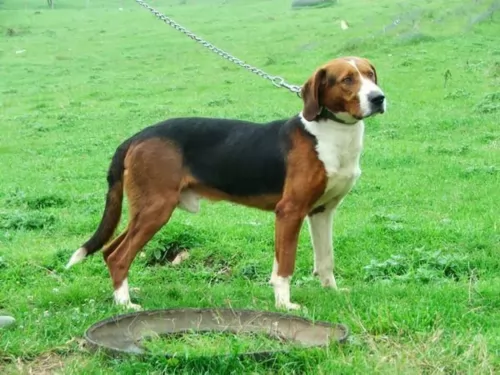 The Serbian Tricolour Hound was once known as the Yugoslavian Tricolour Hound. It’s a rare dog breed that you won’t find much outside of the Balkans.
The Serbian Tricolour Hound was once known as the Yugoslavian Tricolour Hound. It’s a rare dog breed that you won’t find much outside of the Balkans.
These dogs were bred for hunting in packs but in these more modern times they are more of a companion dog.
It is thought that the Serbian Tricolour Hound was a variant of the Serbian Hound until 1946 when a separate breed standard was established. It was recognized by the Federation Cynologique Internationale in 1961.
 The Otterhound has a weather-resistant double coat which is somewhat oily. The coat is available in a number of colors such as wheat, red, grizzle, black, cream and tan with some white markings.
The Otterhound has a weather-resistant double coat which is somewhat oily. The coat is available in a number of colors such as wheat, red, grizzle, black, cream and tan with some white markings.
The double coat is somewhat oily and he has webbed feet, making him particularly suited for his life around water. This large hound stands at between 61 and 70cm and weighs in the region of 35 to 54kg. He has a large head with a nose that can track and scent in mud.
Otterhounds are active dogs, loving nothing more than to be running and playing, and that of course includes swimming. He makes a great sporting companion too and won’t have trouble keeping up with you as you jog or cycle.
These dogs are friendly, social, docile and amicable but they are also strong-willed, stubborn and independent. If you want him to be obedient and well behaved, then he will most certainly require training and socialization.
They get on well with children and will appreciate a firm, consistent, kind owner. He isn’t a city dog as he requires room to run, and therefore a farm or home with large grounds will suit him. Not only that, he is quite a barker, especially when he is bored with nothing to do so city life and living close to neighbors won't do for him . He will suit an active, outdoor family.
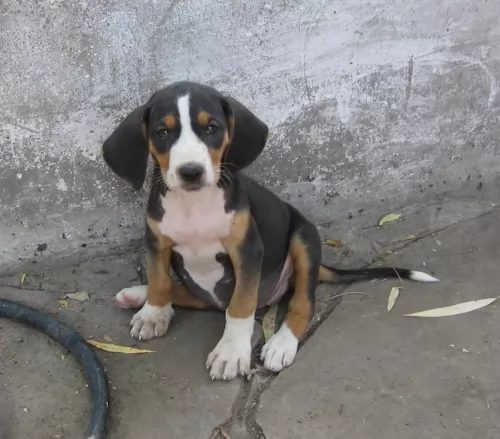 The Serbian Tricolour Hound is a medium sized dog standing at between 44 to 55cm in height and weighing in the region of 20 to 25kg.
The Serbian Tricolour Hound is a medium sized dog standing at between 44 to 55cm in height and weighing in the region of 20 to 25kg.
He is a strong, muscular, solidly built dog with a rounded skull and longish muzzle. The ears of this dog are long and floppy and the long, curved tail hangs down but is held high when the dog is excited.The dog has a short, glossy coat which is essentially a rusty color. There is quite a lot of black with some white on the coat too.
Loving and loyal, this dog was once used for hunting and he has learned to listen carefully to- and respond well to his owner.
He loves his human family and makes a great family pet. He gets on well with the kids, loving to take part in their games. He is intelligent and with training and socialization he is obedient, well balanced and well mannered.
Friendly and social, all he wants is to be with his human family, but even so he is better suited to life with a family who lives on a large property in the suburbs or countryside as opposed to living in the city.
 Your Otterhound is a big, beautiful dog who is also lovable, making a great pet for an active kind of family. He is friendly, social and playful but he is also independent and likes to have his own space occasionally.
Your Otterhound is a big, beautiful dog who is also lovable, making a great pet for an active kind of family. He is friendly, social and playful but he is also independent and likes to have his own space occasionally.
He is a loyal, fun dog who has a sense of humor, providing quite a bit of entertainment for his owner. He is the kind of dog that is willing to be 100% part of the family and will be thrilled to be counted in on all activities – whether camping, hiking or swimming.
Give him the love he craves and he will make you an awesome 4-legged friend.
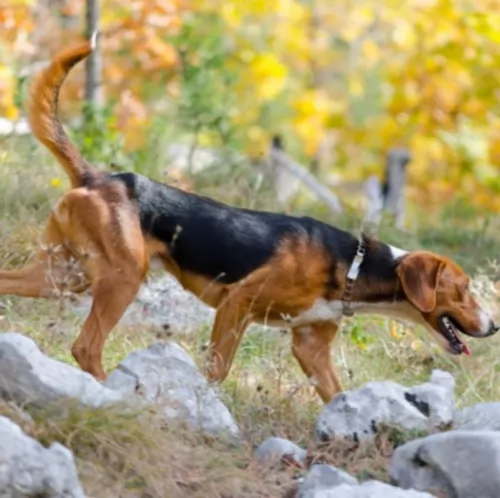 The Serbian Tricolour Hound is a loving, loyal, active, devoted breed that loves his human family, wanting to be involved in all the activities they’re involved in.
The Serbian Tricolour Hound is a loving, loyal, active, devoted breed that loves his human family, wanting to be involved in all the activities they’re involved in.
He is somewhat reserved with strangers but training and socialization helps to make him well behaved around them and it means you can take him with you wherever you go as he is well behaved.
These Serbian dogs make splendid pets, and if you take good care of yours, he will provide you with unconditional love.
 The average lifespan of this dog is between 10 and 13 years, but with good care he can reach 15 years of age.
The average lifespan of this dog is between 10 and 13 years, but with good care he can reach 15 years of age.
The Otterhound is generally a healthy breed but he can sometimes get one or two of the common dog diseases there are.
Common problems that can occur are hip dysplasia. There are things that can be done to prevent this joint condition and one is to ensure your dog doesn’t become overweight. You also want to prevent having your young dog exercise excessively before his first birthday and you don’t want him leaping off beds or other high places.
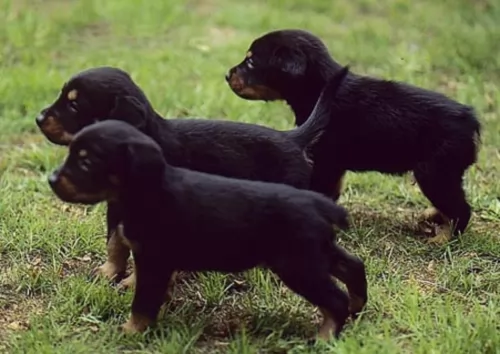 The Serbian Tricolour Hound is such a healthy dog breed and with the right nutrition and exercise can reach 12 to 15 years of age. He is a rare dog breed so there isn’t a whole lot of information available about his health.
The Serbian Tricolour Hound is such a healthy dog breed and with the right nutrition and exercise can reach 12 to 15 years of age. He is a rare dog breed so there isn’t a whole lot of information available about his health.
There are always going to be those common dog illnesses that many dogs succumb to. Some of them are hip dysplasia, cancer, skin problems and parasites.
With his floppy ears, check out the insides of his ears to ensure there are no signs of redness and ear discharge.
Hip dysplasia is a condition where parts of the hip joints don’t fit properly together. This creates a situation where there is abnormal wear and tear on the joints. It can lead to arthritis even and pain for your dog.
The tapeworm is a parasite spread to dogs but also to people and it is through the ingestion of infected fleas. You can often detect this when you discover parts of the worm crawling in your dog’s bowel movements.
Check your dog over for ticks and fleas too when you brush him as these can lead to other illnesses such as tick bite fever.
 Your Otterhound has a curly, longish water resistant double coat which doesn’t shed much. The coat is easy to groom, requiring nothing much more than a brush twice a week.
Your Otterhound has a curly, longish water resistant double coat which doesn’t shed much. The coat is easy to groom, requiring nothing much more than a brush twice a week.
The nails of the dog should be checked regularly and trimmed. Check in and outside his ears as well as his eyes for any sign of infection.
His teeth should also be checked. Some people are reluctant to brush their pet’s teeth, saying this is a new money-making fad and that it has never been required in the past. Whatever your views, periodically check inside your pet’s mouth for the sign of a rotten tooth as this can cause your pet a lot of pain and illness.
The Otterhound has no special food requirements and relies on you to feed him quality, tasty food. For convenience, there are some excellent ready-to-eat, convenient commercially manufactured foods made to cater for your pet’s size and his activity levels.
He also relies on variety in his diet, so give him some home-made food added into the kibble a couple of times a week. Boiled chicken, brown rice or pasta and some cooked vegetables such as carrots, sweet pototoes and spinach will be excellent for him.
He will thank you for keeping things so simple for him as then he won’t be plagued by digestive problems and visits to the vet. You can also add in some raw meat occasionally. Never leave him without fresh, cool water.
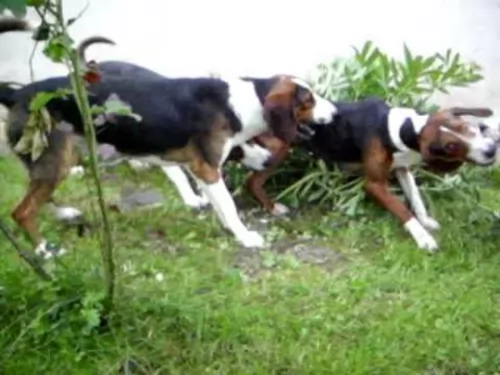 The short, shiny coat of the Serbian Tricolor Hound will require nothing more than a good brush twice a week to keep the coat nice and smooth. You can even take a damp cloth and wipe the coat over with it to remove dust.
The short, shiny coat of the Serbian Tricolor Hound will require nothing more than a good brush twice a week to keep the coat nice and smooth. You can even take a damp cloth and wipe the coat over with it to remove dust.
Provide your dog with a regular amount of exercise every day. Dogs become sad and unhealthy when they’re just stuck in the back yard and left on their own. Take him for walks each day and throw a ball for him to fetch. Simple little games like this will keep him happy as he loves to spend time with you.
Only the very best food is good enough for a dog. Dry kibble is excellent and convenient but try and feed your dog some home-made food too. Avoid spicy, exotic foods as this can upset your dog’s digestive system. Speak to your vet if you’re unsure how to feed your dog to ensure his good health and longevity.